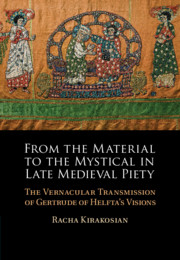 From the Material to the Mystical in Late Medieval Piety
From the Material to the Mystical in Late Medieval Piety Book contents
- From the Material to the Mystical in Late Medieval Piety
- From the Material to the Mystical in Late Medieval Piety
- Copyright page
- Dedication
- Contents
- Illustrations
- Acknowledgements
- Note on the Maps
- Introduction
- One The Helfta Scriptorium
- Two Redactions within a Dynamic Textuality
- Three Manuscript Transmission History
- Four The Book’s Self-Reflectivity
- Five The Scriptorial Heart
- Six Imaginary Textiles
- Final Remarks
- Book part
- Notes
- Bibliography
- Index
Four - The Book’s Self-Reflectivity
Published online by Cambridge University Press: 01 September 2021
- From the Material to the Mystical in Late Medieval Piety
- From the Material to the Mystical in Late Medieval Piety
- Copyright page
- Dedication
- Contents
- Illustrations
- Acknowledgements
- Note on the Maps
- Introduction
- One The Helfta Scriptorium
- Two Redactions within a Dynamic Textuality
- Three Manuscript Transmission History
- Four The Book’s Self-Reflectivity
- Five The Scriptorial Heart
- Six Imaginary Textiles
- Final Remarks
- Book part
- Notes
- Bibliography
- Index
Summary
All medieval writing is to some degree self-reflective, that is, it shows awareness of its own medial (pertaining to its physical materiality) and textual (concerning its contents) status. In a dynamic manuscript culture this means that any witness of a text takes on an authoritative status; this is the case for the transmitted witnesses of the botte. There are different ways to establish rhetorical authenticity in texts; the botte authorises itself through an internal narrative about its coming into being which is compared to the mystical ascent of the soul. The awareness that a sanctified textuality is made manifest in a book takes on a pivotal role in this alignment of internal narrative and the process of becoming Christ’s bride. Textuality is negotiated within the botte in a way that evinces a sense for the existence of multiple text copies in which the core message, theoretically, is always the same. The use of book metaphors and writing imagery conveys that the understanding of text as dynamic is inherent to the botte, and that it forms part of its mystical programme which operates within so-called corporeal images underscoring the importance of embodying effects. Showing that the text’s programmatic beginning follows a rationale according to which any reworking of the Legatus is just as salvific and holy as the alleged first book (as long as the copyist – who is also a reader – has good intentions), I argue that, in the botte, images of writing – relating to acts of copying and redacting – and imaginary reading scenarios are treated as embodied forms of becoming the bride of Christ.
- Type
- Chapter
- Information
- From the Material to the Mystical in Late Medieval PietyThe Vernacular Transmission of Gertrude of Helfta's Visions, pp. 126 - 147Publisher: Cambridge University PressPrint publication year: 2021


